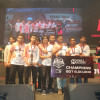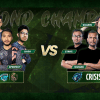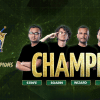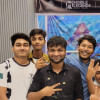Rising from the ashes: Oriental Phoenix, Mobile Legends Bangladesh Champion

In August this year, local fans and gamers were treated to the Mobile Legends Bangladesh Championship (MBC), the official, national-level esports tournament for the mobile game 'Mobile Legends: Bang Bang' (MBBL). Competing against 128 teams, the team 'Oriental Phoenix' emerged victorious, earning a cash prize of US$260 and the opportunity to represent Bangladesh in the MLBB Championship Battle, the regional qualifiers tournament.
In an exclusive interview, team 'Oriental Phoenix' - consisting of Shuvo Ahmed, Abdullah Mashud, Sheikh Matiur, Fahraz Sparsha, Nafees Ahmed, and Naimul Islam - delved into their journey, their triumphs, and the secrets behind their success in the rapidly evolving esports arena of Bangladesh.
How does it feel to emerge as the MBC champion team in Bangladesh?
Shuvo: It feels absolutely incredible. I have to thank my friends and loved ones for their constant support. It's a testament to the sacrifices made, the challenges overcome, and the unyielding passion for the game that drives me and my team.
Sparsha: The tournament was gruelling with so many excellent teams and good players. Our team put in countless hours of practice behind this, and the hard work paid off through this triumph. This win is not just a personal achievement but also a motivation to continue striving for excellence and contributing to the growth of esports in Bangladesh.
Mashud: The feeling of lifting the trophy after intense matches against the best teams in Bangladesh is indescribable. Being crowned the national champion amidst such talented adversaries is an honour that amplifies the significance of this achievement.
How did you start playing 'Mobile Legends: Bang Bang' competitively?
Shuvo: I got introduced to the game through some neighbourhood friends. After trying it for the first time, I fell in love with it. Eventually, I joined their team and started dabbing in the competitive scene.
Sparsha: Some of my online friends introduced Mobile Legends to me, but initially, I wasn't a fan of the graphics and ended up uninstalling it. Later on, I came across an international match between Team Evos Legends and Team RRQ, which made me very enthusiastic about the competitive scenario. That prompted me to get back to the game as a regular player.
Tell us about the beginning of 'Oriental Phoenix'. How was the team formed?
Mashud: The team was formally made in 2018 by me. Our journey started individually, but we eventually met through the game's community. We realised that we shared a common passion and the same competitive drive. Our motivation comes from the love of the game, the thrill of competition, and the desire to push the boundaries of what's possible.
Shuvo: Even though we started in Mobile Legends, we played other games like Arena of Valor (AOV) competitively. We even won the GPxAOV Tournament in 2021. But considering the opportunity and international recognition in MLBB, we came back to this game to represent our country.
What were your expectations before the LAN event of the MBC tournament?
Shuvo: As we had shifted from Arena of Valor to Mobile Legends, we initially faced challenges learning the brand-new metagame. We also faced other problems such as personal player issues, inconsistency in performance, and building the proper synergy. Even five days before the tournament began, we were unsure about participating in it. So, becoming the champion in the end was unexpected for all of us.
Sparsha: Adding to that, we even changed some roles of our team. We shifted our 'jungler' to play as 'roamer'. We even assigned a new 'jungler' in his position. The victory was definitely out of the blue but hard work paid off at the end.
What was the most remarkable moment of the final match?
Sheikh: Even though we had previous experience playing in LAN events, we still lost the first match horribly. Thus, we were under pressure at that moment. However, Sparsha pushed me a lot - he told me to enjoy the upcoming matches and play with my whole heart. His encouraging words hyped me up and I gave my all in the next matches, eventually winning.
Sparsha: For me, the most intense moment was when our 'roamer' Nafees stole the 'lord' from our opponent with his hero 'Kadita' without any retribution. That made all of us believe in ourselves and we gave our 100% to win the game. We later won the series with a score of 3-1.
What was it like representing Bangladesh on the international stage?
Sheikh: We were very nervous. It was our first time representing Bangladesh out of the border. One of our members didn't have a passport and he couldn't make it to Nepal. So, we had some changes in our lineup. However, the time was short to get the right synergy and coordination with the new lineup. That is why we were unable to get the expected results in that tournament - getting eliminated in the group round.
Sparsha: Adding to that, all of our opponents from other countries got huge support from their home crowd. We were in an adverse situation, which was a new experience for us.

Do you see esports as a viable full-time career option?
Shuvo: Gamers and esports competitors in various countries rake in millions through tournaments or streaming their gameplay. However, despite investing substantial time in learning mechanics, devising strategies, and dissecting top players' gameplay, we don't earn a cent. If we get financial support from authorities or sponsors we can see it as a viable career option.
Sparsha: Even our parents are not giving us enough recognition. Without any financial support, it is very difficult for us to achieve success and have a professional career. Unless substantial shifts occur in our country's esports landscape, I don't think esports is a career option for me.
What changes do you wish to see in the competitive scenario in Bangladesh?
Mashud: As other nations have begun to invest in esports, we feel our government must extend similar levels of support. Our foremost aspiration is the official recognition of esports as a legitimate sport, a step that can unlock avenues for financial backing and the development of infrastructure within our borders.
Nafees: Access to resources is essential, and achievable through sponsorships and investments. Across the globe, teams can afford top-tier coaches and analysts due to substantial financial support from sponsors and governmental backing. Furthermore, increased sponsorships can establish esports as a viable career path within our nation. Implementing necessary adjustments could foster a thriving esports landscape, benefiting both players and our country as a whole.
What advice would you offer to those who aim to reach the level of success your team has achieved?
Shuvo: Reflecting on our journey, what truly sets our championship-winning team apart in the esports scene is a combination of factors. Firstly, unwavering dedication to continuous improvement and a willingness to adapt to the ever-evolving competitive landscape. Secondly, you must have exceptional teamwork and communication honed through countless hours of practice and trust-building, which would allow any team to execute complex strategies effectively. Lastly, it is important to maintain a positive mindset even in the face of adversity; embracing losses as opportunities for growth.

 For all latest news, follow The Daily Star's Google News channel.
For all latest news, follow The Daily Star's Google News channel. 









Comments